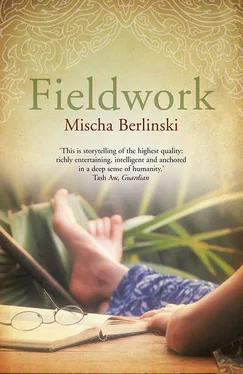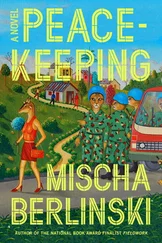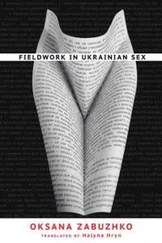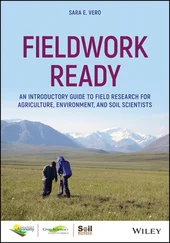"Honey, do you want to take a shower before lunch?" Norma asked.
"Are you saying I smell?"
"Nothing a little lye wouldn't fix."
"I bathed in the village this morning," David said.
"Next time try using soap and water."
David still had the same grin on his face. Norma finally had enough. "Honey, just a word saying where you're going and when you're coming back, that's all I ask. I worry."
But David hardly heard her. He was still grinning, that same odd grin. "Mom, do you remember Moo Bat Yai? With Headman Honey?"
"Of course I remember Moo Bat Yai. Headman Honey is up there."
"I was in Moo Bat Yai. I couldn't leave."
"But why? For a month?" Norma's heart began to pound faster.
"Twelve."
"Twelve?"
"Twelve. Headman Honey. His wife. His oldest son. A guy from the Fish clan — you don't know him, he's new. His wife. And the rest from down the hill, four in the Wood clan, and three from the Rabbit clan."
"Oh my," said Norma. "Have you told your father yet?"
"Not yet."
"Go now. He'll be so proud he could die."
Norma was right, as usual. Thomas was so proud of his son that he could die. For the two years following his return, David wandered the mountains, carrying nothing but a small backpack and his guitar. Norma could not help but hold her breath when David was gone, but she loved the moment when he walked back in the door. On Thomas's map of the Dyalo villages of northern Thailand, the purple pins, which indicated a wavering people, and the black pins, which indicated the deepest heathenism, steadily turned white, one after another.
David had been back in Thailand for a little over two years, Norma told me, when Laura had her stroke. She was sitting in the garden on a bamboo-and-rattan chair that her grandson Paul had made for her as a Christmas present when she felt a little weak on her left side. That was all she felt, just a little weak, but when she tried to stand up, she collapsed on the crabgrass lawn, and it was almost an hour until Norma found her lying there. She didn't mind the wait, Laura told the family later, because that's when she saw the very first of her crosses. At first she wasn't sure if it was anything more than the play of light and shadow on the cement foundations of the house, but as she lay there, wondering just what was going wrong with the left side of her body and feeling very frightened, she realized that it was a cross, and she could even see the grain of the wood if she looked closely. When she looked even more closely, she saw stains from His blood.
The family took her to the hospital, and took her home, and she spent her last year sitting in her rocking chair. For the rest of her life, Laura saw the crosses regularly. She saw them in the dust motes playing in the late-afternoon light, in the irregular formations of early monsoon clouds out the windows, in the dirt on the floor, even in the folds of the fake-leather couch. Laura had thought, leaving Eden Valley, that her happiest days were behind her, but she was wrong.
"She was so happy," Norma said. "She couldn't talk much, but she had such a big smile, that was the best time of her life. There was a real peace in the house right before she died. Do you know what her last words were? Her last words were, ‘Thank you.' Isn't that a beautiful way to go Home?"
"It is," I agreed.
Norma was silent for a long minute.
"It was hardly after that at all that that woman …"
Just eleven months after Laura died, two young Lisu boys found David's partially decomposed body in a remote valley to the northwest of Chiang Mai. He had fallen a great distance, then been shot twice in the back. He was buried beside Laura in the family plot at the Chiang Mai Foreigners' Cemetery.
PART THREE. THE NATIVE'S POINT OF VIEW
THERE WAS NO NATURAL ENDto Walkerology, and in the spirit, if not the endurance, of the heroic Sir Richard Jebb, who studied all— and only — the seven surviving plays of Sophocles for upwards of sixty years, I would have been content to study the Walkers for a very long time.
But then the Walkers stopped talking. Just what happened I'm not sure. For a happy month, I interviewed Walker after Walker, taking them aside with my notebook and tape recorder, asking questions. They'd been eager to talk to me; a few even said that they wished their kids were as interested in the family history as I was. But then, sometime in mid-April, nobody seemed to have time to talk to me anymore. I don't think that I offended anyone. Maybe I said the wrong thing. I don't know. Aunt Helena went back to the States to visit her children. Tom Riley stopped having breakfast with me, saying he'd put on ten pounds since we'd started meeting and he'd call me when he lost the spare tire. The truth, I suspected, was that things were going so well with Judith that he no longer felt the need for my services. I figured he'd call when they had their first fight. Everyone was still nice to me on the phone and very polite and still said "God Bless You" before they hung up, but everyone inevitably had other commitments or was going off somewhere really exotic without me or on prayer dates with other Christians, to which I, of course, being a heathen, had not been invited.* It's possible, I suppose, that middle April is just a very busy time for missionaries, as it is for accountants, what with Easter and the existential despair which inevitably accompanies the humid days toward the end of the hot season. I even stopped by the big pink house one day uninvited, but only Ah-Mo was around, and in her broken Thai she explained to me that Thomas and Nomie had gone-gone, far-far, and wouldn't be back for a month.
They hadn't even said goodbye.
It might seem strange, but in the absence of the Walkers I fell into deepest gloom. It was right before the Songkran holidays. Brown clouds covered the city. But it would not rain. I took a shower in the morning, another at midday, then one in the early evening, and a final one before bed; and after every shower, I dusted myself liberally with mentholated prickly heat powder. All day long there were tantalizing moans of distant thunder on the horizon, falsely suggesting that soon, very soon, achingly soon , the explosion of the monsoon would be on the city. Or worse: standing on the crabgrass lawn outside our concrete house under the swaying palms, I would feel a fast wind stirring up, and then a single, immensely large plop of rain would tumble on my upturned forehead. And then — nothing. The thunder would roll over again, the dogs would dart for shelter, the palms would sway in the wind, and then — nothing.
Meanwhile, I was almost broke. All that time with the Walkers, I wrote nothing. I did not pitch a single story. I would rather have been Left Behind than write one more word about another local jazz quartet, wood carver, pub, pizzeria, or tailor. The Thai gazillionaire who had once asked me to write short summaries of English-language business books had been implicated in some incomprehensible Thai financial scandal; I sent an e-mail to his secretary, offering to summarize books about criminal justice, but got no response.
Rachel's questions about the year to come were growing more insistent. She wanted us to figure out where we were headed and what we planned to do with ourselves. If we didn't take action soon, she faced an-
*Not one of the Walkers ever attempted in any way to preach the Gospel to me. There was an occasional flutter of curiosity about my own religious beliefs, which the Walkers assumed I held as intensely as they hewed to theirs, but otherwise they betrayed a complete indifference to the state of my soul. You tell me why.
Читать дальше












